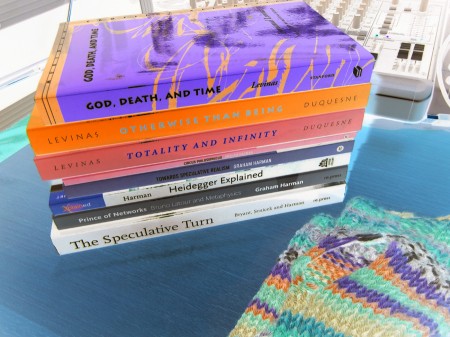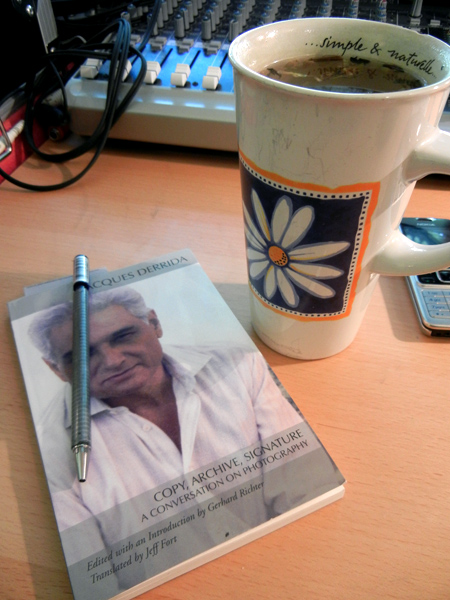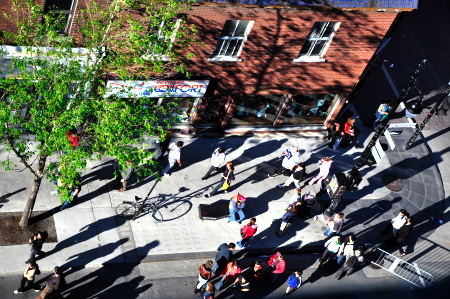
Levinas on top.
So here you have it: something of the reading program I will be ploughing through shortly. I’ve been through Levinas before, but not yet an extended engagement. As for Harman, I am indeed looking forward to Circus Philosophicus, in the hopes it will provide more varied discussion of the hidden world of objects than the rote repetition of thought that makes up Tool-Being. I find him at turns infuriating and liberating, which means I will certainly grow to like him.
I picked up Paul J. Ennis’ Continental Realism yesterday on Kindle, but it is unfortunately nor formatted properly—no hyperlinked endnotes. I did contact Ennis and the publisher, so hopefully they are able to fix this formatting error and re-upload it to Amazon (Amazon removed it; sorry Paul!).
I’ve got Quentin Meillassoux’s After Finitude on my bookshelf but I’ve only skimmed it. I found Meillassoux oddly authoritarian—since when must philosophers answer questions of the type “does X exist?” yes or no? Especially under conditions when scientists and laypeople do not? If this is the new form of philosophy, it is an authoritarian one that rests disturbingly assured upon the principle of non-contradiction. I find this disturbing—kind of a philosophy as authoritarian interrogation. But I’ll get to it soon enough.
I’ll turn to it before I finish Ennis, as I have too many questions that remain quite unanswered, so far, in Ennis’ exposition. For starters, scientists are granted the privilege of answering to questions of the type “is X scientific fact true, yes or no?”, YES, but with the following provision:
These statements will not be considered complete or unrevisable. Falsification is always possible for the physicist, but until a better theory is put forward the scientist will claim that it is sensible to accept the statement as true. (Ennis 2011)
Sure, this is the scientific method, which is entirely contingent: for now, this statement is true, given it has not been falsified. This for now is necessarily open; otherwise the scientific method would resort to the hypostasis of dogmatism. And an anthropologist, as well as a physicist of general relativity and quantum mechanics will add, in various ways, the “for us” as well as the for now. So first off, it is not only philosophers who add this “for us,” but science itself. Second, this “for us” is more complex than simply designating a human observer. Third, I don’t believe that all of science operates upon the assumption that the “for us” threatens “realism”—on the contrary, the “for us” conditions it—that such positions that negate/ignore/forget the “for us” are somehow better than taking into account the complexities of the observer (including the technics of perception), the info-technical apparatus used in experimentation (the very parameters of measurement are subject to change, the technologies of experimentation, and so on), and overall, temporality in its basic open-ended form, insofar as all of these variables may change (even, in certain conditions, the speed of light).
Point being, the for now of the scientist holds the same structural position as the for us of the philosopher; both are a fundamental position taken in regards to the open-ended futurity of temporality that recognizes the contingency of the observer. And, this observer includes the entire technical apparatus of measurement (the laboratory, the technologies involved, etc., right down to the technics of the theorem and mathemes). So there is a difference here, unthought, between the for now and the for us which is privileged: whereas scientists are granted the for now, philosophers are not granted the for us, despite that, when taken as structural positions of contingency in regards to temporality, both perform the same effect.
This can be explained in both philosophy and science. In general relativity, the position of the observer shapes time. In Derrida, différance is precisely timing-spacing for a reason: time-and-space are variables whose structural positions are contingent and relative. In sort, Meillassoux denies the contingency of timing-spacing and privileges a simple time (of future possibility) over the complex time of its positioning (spacing). Simpler again: Meillassoux privileges time over space. He does so against the grain of all 20th century science and philosophy. Why?
In any case, philosophers are not, apparently, granted the same contingency as the scientific method and of scientists themselves to include pauses or provisions in their replies. Instead, Meillassoux demands they answer like this, kind of like the Spanish Inquisition of philosophy:
“Did the accretion of the earth happen [i.e. the historical record of the Earth based upon carbon-dating], yes or no?” (After Finitude, 16)
Yes, of course it did, I would answer, and just like the scientist: for now, for us. That carbon-dating is based upon a method which was “perfected” in the early 20th century does not preclude changes in measurement or technologies of dating that might occur; it does not preclude warped theories of time travel that might change this record (hey, if Stephen Hawking can go there, why can’t I?); it does not preclude, in short, any possible temporal shift in all manner of technics which would fundamentally alter the trace of différance. To think otherwise would be to trap science (and all observations and truth-statements) into a far worse hell than that of supposed “correlationism:” absolute dogmatism.
So let’s pretend it’s the late 19th century and phrenology is accepted as a science. And someone like Meillassoux comes along and says: “So, are Negroes born criminals, yes or no?” See the problem here?
The temporality of the scientific method cannot simply be collapsed for the sake of securing some kind of fundamental assurance in things. Indeed Meillassoux seems to think that any questioning of temporality, technics of measurement, and so forth, amounts to some kind of “anti-realist” stance (known, apparently, as “correlationism”). I find the entire framework of his thesis unconvincing in terms of the discourse of science itself, which I think is where Meillassoux et. al. are on weak ground. In short, I don’t think there is a fundamental problem with contingency—nor does science. It appears that Meillassoux et. al. think this is some sort of grave error we all desperately need to be rescued from by removing the complexities of contingency and accepting an unconditional YES: it’s ALL Real! This would, it seem, merely repeat all the errors of the pre-scientific method past: dogmatism, refusal to accept change, the Inquisition, etc.
As for the for us, I have yet to read, either in Harman or Meillassoux (and I am not done yet), a questioning of the “us”, which so far, assumes that the “us” is a simplex of the human individual. The error here is not that taking into account the position of the observer, or the technics of perception of the human, is somehow a mistake—on the contrary it allows us to account for this positioning rather than simply ignoring it through the blind belief in our technologies of measurement or theorems of science as providing access to direct truth—it’s mistaking the “for us” as reducible only to the human observer in the Kantian sense.
So let’s grant Harman’s observation that all things are beings—it was already made by Deleuze, Derrida, etc. years ago anyway—and reiterate: all things are observers; general relativity applies to all. So does indeterminacy and contingency. In short, arguments of Meillassoux’s type are more anthropomorphic than they realise: they naively assume that “for us” equates to the human (and that we know what this human is, inside and out), when the more complex understandings of the “for us,” long past Kant now, take into consideration a quasi-transcendental logic, or alter-logic, which deconstructs not only the human-being, but all beings (as becoming, etc.).Sure, the 20th century was occupied with the (human) subject. I’m glad that we’re going to talk about other things now. But is branding all talk of the contingencies of the decentred subject “antirealist” at all helpful or correct? Easy answer: no, not really.
This is the same kind of argument I have so far with Harman, who also limits language to merely something among humans. If language is the trace of alterity, is alien, and is generative of the effect of consciousness (Derrida), then it cannot be said to be properly human, either. In the language of Heidegger, the things speak—and I grant to Harman that we all—dust to quirks and quarks—be things (which is to say, beings).
So far, both Meillassoux and Harman need to severely constrict their readings to rather straightforward Kantian transcendentalism or linguistic analyses which already presume language as a human construct; neither have yet dealt with the likes of Deleuze (who directly engages science throughout), Lacan (whose mathemes of the subject provide the kind of numerical basis Meillassoux champions) or Derrida (whose thinking of arkhe-writing and the quasi– provide a much more difficult challenge to a simple realism/antirealism diatribe). (I remain to read the rest of their work, so this is a provisional statement; however, so far this thesis has held for a few hundred pages now—we’ll see if there are any surprises.)
What I find particularly odd is that Meillassoux claims to be setting out to somehow defend science, and yet in doing so throws out the baby with the bathwater, trapping science in a simplism of yes/no thinking which is not how science operates (we haven’t even yet begun to discuss chaos theory). Moreover, it ignores utterly the more interesting thought from quantum physics and general relativity, which, by the way, have yet to be “unified.” Just about a century later, these two observable theories of physics have yet to find their common—how does Meillassoux handle this intractable paradox of both the yes and the no, within science?
So a proposed title of an essay, a position which is a position for philosophy itself—For Now, For Us, Yes (perhaps). Ooooh, how Derridean. Indeed: the hard Derrida deserves his return right about now. The difficult, early, very well-read, incredibly thorough, and not-so-generous Derrida. Derrida with the scalpel.
If philosophy now means, under speculative realism or OOO or whatever, being forced to answer yes/no, then all this means to me is that philosophy has been handed over to the police. I’d rather not police thought.








 RT
RT 